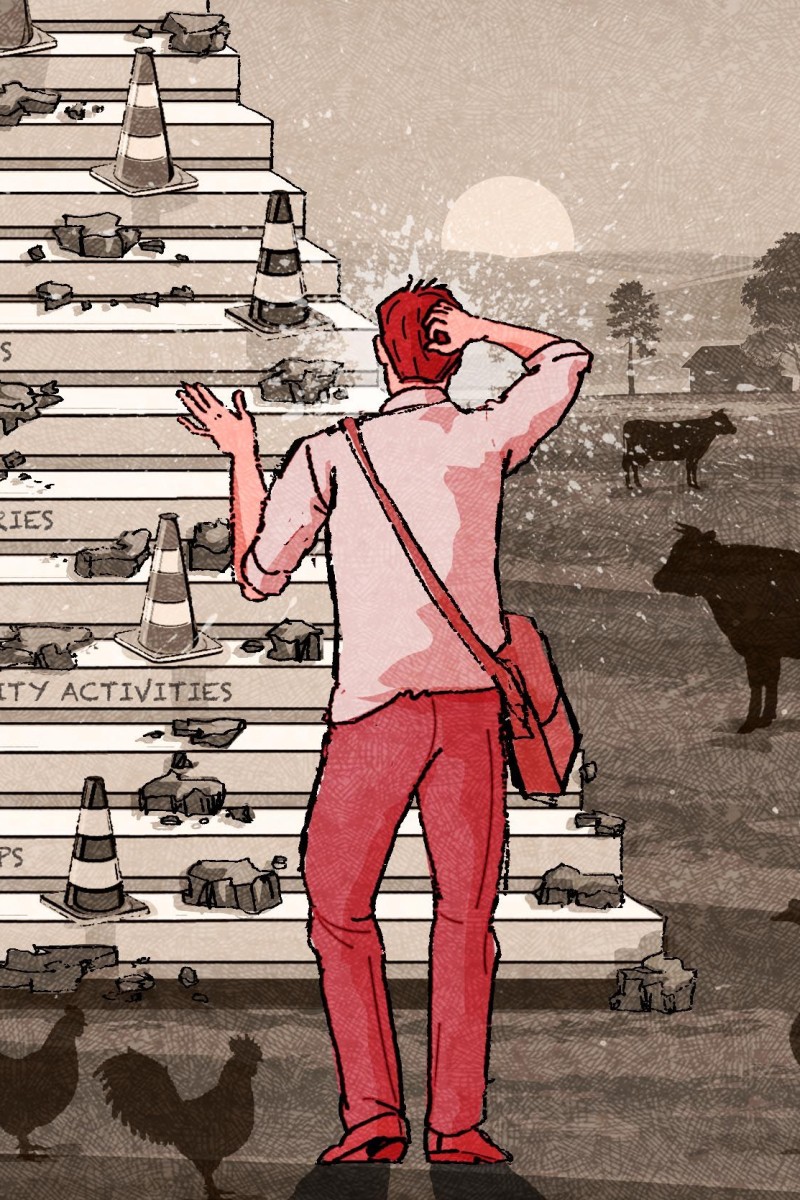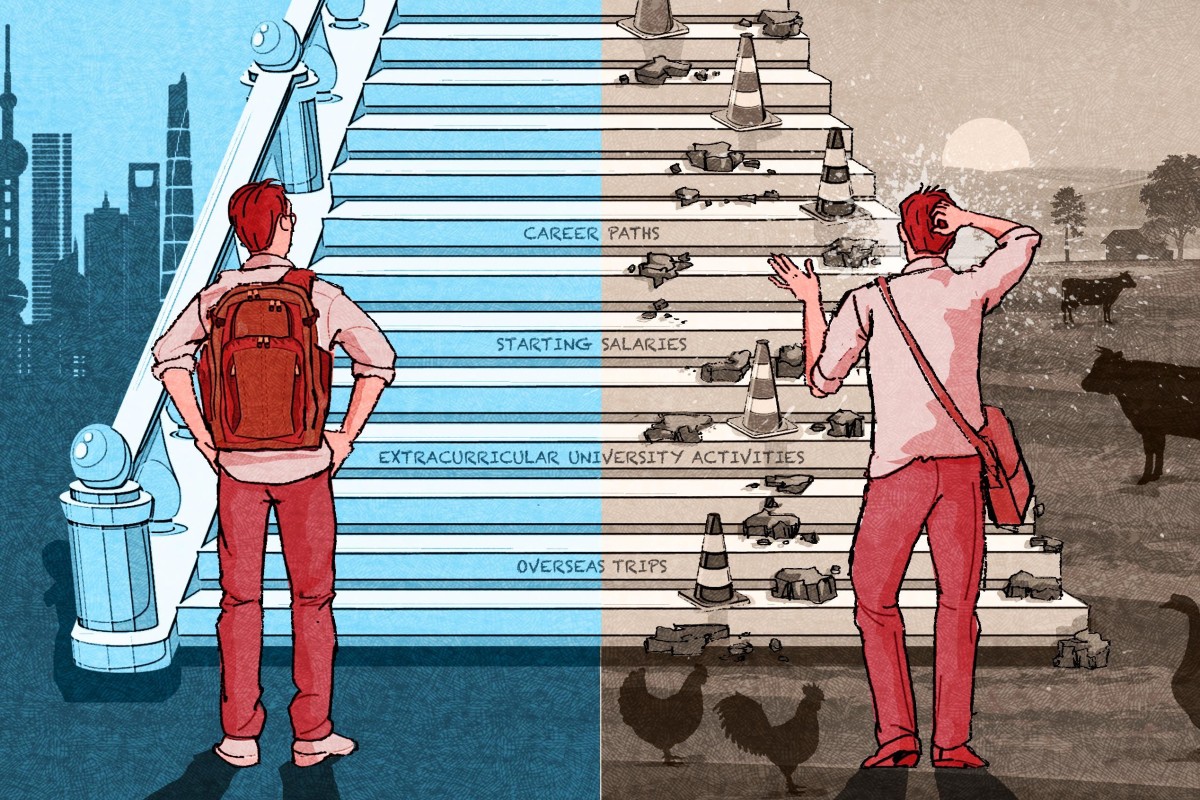
Study Buddy (Challenger): China’s rural students face upward mobility battle even at the country’s elite universities
- Research has found that while most students from rural backgrounds would find jobs, they would not reach the same level or starting salaries as their urban counterparts
- This page is for students who want to take their understanding to the next level with difficult vocabulary and questions to test their inference skills
 In their jobs, China’s rural students often do not reach the same level or starting salaries as their urban counterparts. Graphic: Henry Wong
In their jobs, China’s rural students often do not reach the same level or starting salaries as their urban counterparts. Graphic: Henry WongContent provided by British Council
Read the following text, and answer questions 1-9 below:
[1] Xinjiang-native Ma discovered her choice of studying Hungarian at university was not only tough academically, but also financially – two factors which would weigh on her chances to gain employment. The 21-year-old’s lack of overseas experience could weaken her competitiveness in China’s job market when she graduates next June as Covid-19 controls and the economic downturn have led to shrinking employment opportunities and made upward social mobility harder for rural students from humble families.
[2] Research has found that students from China’s rural areas often struggle to afford extra costs at university, such as overseas trips and extracurricular activities, which can mean they do not reach the same employment levels or starting salaries as their urban counterparts.
[3] Rural education and social mobility specialist Ailei Xie found that while most students from rural backgrounds would find jobs, they would not reach the same level or starting salaries as their urban counterparts and would feel less stable in their roles.
[4] “Students from rural backgrounds are less familiar with the employment culture of elite universities. They usually prepare for jobs late and also lack clear employment goals and systematic planning,” said Xie, an associate professor at Guangzhou University.
[5] Xie found, across several research projects, that rural students were less socially engaged in university than their urban counterparts, undermining their human capital skills, such as communication, collaboration and leadership, which are crucial for employment.
[6] According to “The Global Social Mobility Report 2020” released by World Economy Forum, few places have the right conditions for social mobility, so income inequalities have become entrenched globally. Despite high-quality education in urban centres, China ranks 45th among the 82 countries surveyed for the social mobility index. This is largely due to its wide disparities in education quality across regions, according to the World Economy Forum.
[7] Even without financial issues, having a rural background can still affect some students from wealthy families. After completing her undergraduate degree at an elite university in Shanghai, Huang Yu is now studying in Switzerland, but her wealthy family background and extensive educational experience still do not help with her low self-esteem.
[8] “Anything tainted with the label of rural, town, countryside or mountainous area brings a hint of coloured spectacles for others to see,” said the 23-year-old. “The fact of being a rural student is like an evil inside my mind making me feel I lag behind my urban classmates, which brings me internal conflict and torment within myself, and I have no confidence to compete with them.”
[9] Academics have acknowledged that rural students are less engaged in campus and social activities at elite universities, which can lead to poor academic performance and conservative career choices. “More often it’s not by virtue of their individual skills at work to make an upper-class leap, but it involves social networks and information gaps,” Huang added.
Source: South China Morning Post, November 25
Questions
1. Paragraph 1 sets a ________ outlook on Ma’s job prospects after she graduates.
A. optimistic
B. grim
C. encouraging
D. serious
2. List TWO things mentioned in paragraph 2 that many students from rural areas lose out on when they join the workforce. (2 marks)
3. Find a phrase in paragraph 4 that refers to the “attitudes and behaviours of employees within an organisation”.
4. In finding employment, how do students from urban backgrounds have an edge over those from rural areas, according to paragraph 4? (3 marks)
5. In paragraph 5, many employers prefer to hire graduates who are more socially engaged in university because they possess ...
A. technical know-how.
B. basic knowledge.
C. necessary soft skills.
D. all of the above
6. What reason is given in paragraph 6 for China’s ranking in the “The Global Social Mobility Report 2020”?
7. In paragraphs 7 and 8, what does Huang attribute her “low self-esteem” to?
8. Who does “them” in paragraph 8 refer to?
9. Decide whether the following statements are True, False, or the information is Not Given in the text. Blacken ONE circle only for each statement. (4 marks)
(i) Students from rural parts of China usually receive scholarships to study in university.
(ii) Starting salaries of graduates from rural areas are lower than that of their counterparts in Asian cities.
(iii) Students studying in universities in China have to fork out extra money for additional expenses such as extracurricular activities.
(iv) Huang believes urban students’ life experiences do not give them an upper hand in the job market.
Answers
1. B
2. higher starting salaries, higher job levels
3. employment culture
4. They prepare for jobs earlier, have clear employment goals and plan systematically. (accept similar answers)
5. C
6. Its wide disparities in education quality across regions
7. coming from a rural background
8. Huang’s classmates from urban areas
9. (i) NG; (ii) NG; (iii) T; (iv) F
